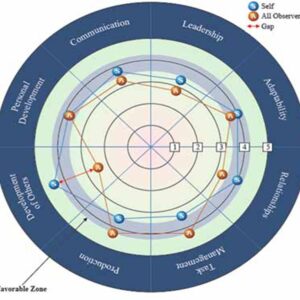An Overview
Profiles Managerial Fit is a management assessment tool used to provide insight into managerial compatibility between managers and their direct reports so they can work together more effectively. The assessment was also designed to provide supervisors with important information about an employee’s significant behavioural tendencies and will help the manager’s efforts for enhancing the working relationship. It provides specific steps to increase manager and employee productivity and foster better compatibility in the workplace.
The more a manager understands their relationship with an employee, such as similarities and differences, the greater their potential understanding of how to manage that employee. Generally, when the manager’s characteristics align well with the employees’, their communication, expectations, and performance are good. When this Managerial Fit is a mismatch, performance suffers.
Work more effectively with each employee by recognising where their perspectives are similar and where they differ.
Understand the dynamics of the supervisor/subordinate relationships.
Easily identify developmental opportunities.
Coach and develop managers to be more effective leaders.
What The Assessment Measures
This assessment is designed to provide information concerning the compatibility of a supervisor with his or her direct report. The intent is to make individuals who work together in a supervisor-employee relationship aware of some of the differences in their approaches to both their work and their relationships in the work environment. The assessment will look at six different characteristics and compare the similarities and differences between the two of you, namely:
Self-assurance – is seen as one’s level of influence/assertiveness toward another person or group. It may be associated with a high level of confidence.
Self-Reliance – is one’s desire to work free from the constraints of other people, to operate using their own resources. It may be seen as a person’s need to work autonomously without input from others.
Conformity – relates to one’s willingness to follow established protocols without questions. It is associated with accepting and following rules as opposed to defiance.
Optimism – is the level of trust one is willing to express toward another person or group. It relates to the tendency to believe that things will have a positive outcome.
Decisiveness – relates to the capacity a person has for accepting risk associated with making a timely decision based on available information. It may be seen as the willingness to take action with limited information.
Objectivity – is the level at which one uses logic and reason more than intuition to solve problems. It is seen as a person’s need to have proof before taking action.
Approach to Learning – an indication of the anticipated approach to learning and problem-solving. Those with higher scores tend to expect a faster-paced learning environment.
Reports Available
The Manager’s Report for the Profiles Managerial Fit considers the results for the Manager and the Employee on seven scales and is reported in four sections. The scores for seven scales are presented for each individual as Low, Moderately-low, Moderately-high, or High. This allows the manager to see the relative relationship of the scores. Typically, the scores for either individual who has taken the survey are not shared with the employee. The four reporting sections are as follows:
Profile Summary – a summary description of both the manager and the employee.
Comparisons Summary Graph – a visual display of results for both the Manager and the employee presented for each scale in a format that allows for an easy comparison of their relationship.
Working Together – a detailed commentary on the relationship of the Manager and the Employee based on their individual results for each scale.
Action Steps – suggestions for the manager on the effective use of the information in the report and for working with employees in general.
The seven scales considered in the Profiles Managerial Fit Manager Report are Self-assurance, Self-reliance, Conformity, Optimism, Decisiveness, Objectivity, and Approach to Learning.
These seven scales are defined as:
Self-assurance – one’s level of influence/assertiveness toward another person or group. It may be associated with the level of self-confidence.
Self-reliance – the desire to work free from the constraints of other people; to rely on one’s own resources. It may be seen as a person’s need to work autonomously without input from others.
Conformity – relates to one’s willingness to follow established protocols without question. It is associated with accepting and following rules and policies.
Optimism – the acceptance of the motives of another person or group. It relates to the tendency to believe things will have a positive outcome.
Decisiveness – relates to the capacity a person has for accepting the risk associated with making a timely decision based on available information. It may be seen as the willingness to act with limited information.
Objectivity – the level at which one uses logic and reason more than intuition to solve problems. It is seen as a person’s need to have objective facts before taking action.
Approach to Learning – an indication of the preferred approach to learning new information. Some individuals prefer a more structured approach, while others prefer one that is more flexible.
Administration
An assessment link is sent via email to both the manager and the direct report. The assessment takes 20 minutes to complete and relevant results are forwarded to the manager and employee.
Need More Information?
Email: moreinfo@powerassessments.com
Call: +27 82 685 8896





